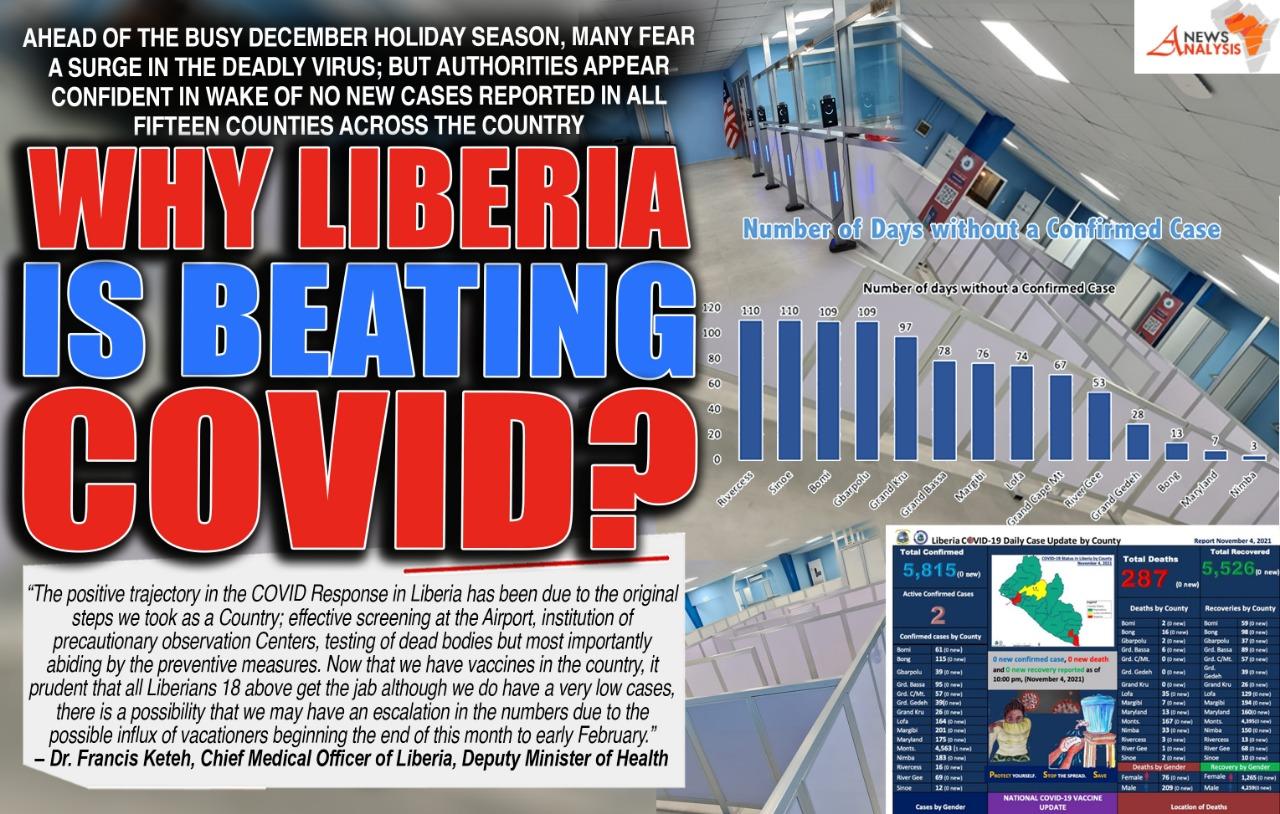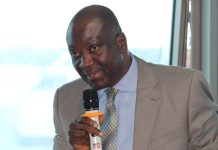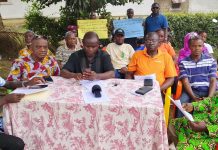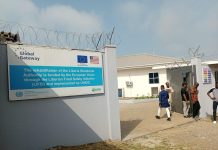Africa-Press – Liberia. A lot of myths have been floating around regarding the low count of the deadly Covid-19 pandemic in Liberia. As the rest of the world grapple with the virus, results have been far from shattering in Liberia and most of the West African sub-region.
Currently, only two out of fifteen counties in the country have confirmed cases with only three active cases to date, in Montserrado and Nimba Counties respectively.
The Jab is the Key
Dr. Francis Kateh, Chief Medical Officer of Liberia and Deputy Minister of Health says the positive trajectory in the COVID response has been due to the original steps taken as a country. “Those steps include the effective screening at the Airport, institution of precautionary observation Centers, testing of dead bodies but most importantly abiding by the preventive measures.”
As airports, borders and seaports brace for an influx of travelers, many are beginning to fear that an upsurge is likely. But Dr. Kateh explains that now that there’s enough vaccines in the country, it is prudent that all Liberians 18 above get the jab even though the number of infections is low.
Says Dr. Kateh: “There is a possibility that we may have an escalation in the numbers due to the possible influx of vacationers beginning the end of this month to early February. As we observe the global trends, we see an increment in the cases in Europe and other western countries, hence some of the vacationers would come to Liberia in live within the communities. Yes we will continue to do screening at the port of entry, the disease has an incubation period hence at the point of screening, a person may go through, but individuals can be sure of fighting the virus if he or she has been infected if they get the jab. Please I urged all Liberians to get their jab as soon as possible to avert what we experienced in early June and July.”
Cases Came in Waves
Liberia reported its first case in March in March of 2020 when the outbreak was at its peak. The number of cases increased from three in March 2021 to 1,189 cases in July 2020. According to the Incidence Management Team, the period (March-July 2020) was described as the first wave of the pandemic in Liberia.
Lessons learned from Ebola Virus Disease and other outbreaks were used as a response plan. Following the implementation of robust interventions including active case findings, enhance surveillance, contact tracing, testing and isolation of cases, community transmission was disrupted for a period of three months (August – October 2020).
The second wave started as a result of non-adherence to public health safety measures, organization of super spreader events such as the mid term elections, the national county meets and the festive season that is occasioned by large parties, huge return of diaspora Liberians from infected countries.
This led to a spike in cases from 90 cases in October 2020 to 194 cases in November and 217 cases in December 2020. The number of cases plummeted in subsequent months (January 2021 to April 2021) due to cost effective interventions, improved case investigation, contact tracing, testing and isolation. However, due to the introduction of new variants of the virus coupled with the non-compliance to public health regulations, the number of cases increased and led to the third wave in late May 2021.
The third wave of the outbreak started in late May 2021 with increasing number of cases, deaths within the population and health workers’ infection. The month of June 2021 recorded 2,094 cases while July 2021 documented 1,147 cases. These two months’ account for 60% (3,241) of cases reported during the entire outbreak with an average daily infection rate of 58 cases compare with an average daily infection rate of 5 during previous months (March 2020-May 2021). This wave witnessed panic with in the population and the imposition of stringent health regulation. A total of 86 COVID-19 deaths were reported within 442 days of the response compared to 151 confirmed COVID-19 deaths within the third wave, accounting for nearly three deaths daily. There has been an increased healthcare workers’ infection by 35.3% (from 224 at the end of May 2021 to 346 on July 26, 2021) during this wave with three deaths. Severe forms of the disease were reported among patients admitted in the treatment centers across the country especially amongst individuals above 35years of age and those with comorbidities.
No Shortage of Vaccines
In the midst of scarce resources, authorities at the Ministry of Health and the Incidence Management Team says Liberia is not quite out in the clear and the recent arrival of vaccines in the country, while crucial, will depend on a skeptical population, taking the shots.
Additionally, the Incidence Management System team, in anticipation to interrupt community transmission, reduce the burden of COVID-19 on the population and its associated consequences, the Incident Management System deployed several cost effective and robust strategies.
Key among them is the quest to Inoculate the population
In recent weeks, the Government of Liberia with support from the COVAX FACILITY received, 96,000 doses of AstraZeneca vaccines and on July 25, 2021, the Government of Liberia received 302,400 doses of Johnson and Johnson (J&J) vaccines from the United States Government through the COVAX FACILITY in collaboration with the African Union and African Center for Disease Control and Prevention.
An additional 96,000 doses of AstraZeneca vaccines were received in August 2021 to vaccinate all those that were due for their second dose and through the World Bank Group, additional Financing Agreement, 386,452 doses of Johnson and Johnson vaccines were acquired through the African Vaccine Acquisition Trust (AVAT) in August 2021. The European Union (EU) in September 2021 provided 200,000 doses of J&E to accelerate Liberia’s covid-19 vaccine rollout process aim towards attainment of herd immunity.
Additionally, 1,157,200 doses (842,200 doses of J&J and 315,000 doses of AstraZeneca) of vaccines were acquired since March 2021, 427,729 persons vaccinated and 420,405 fully inoculated to-date. This figure translates to 21% of the 1.8 million people (40%) targeted to be fully immunized by December 31, 2021 based on the World Health Organization’s projection of herd immunity (52% of population 18 years and over) in early 2022. The administration of these vaccines increases immunity and minimizes severe forms of the disease. There have been frantic efforts by the COVID-19 Incident Management System (IMS) to ensure that Liberia achieves herd immunity earliest.
Testing Upgrade a Boost
The IMS has also undertaken the task of making Improvement in testing with the introduction of rapid diagnostic test (RDT) at the Airport which has reduced the importation of cases and timely detection of cases into the country. The IMS has established testing facilities at the Star Base treatment site, at JFK Medical Center and has provided RDTs to hospitals and County Health Teams to boost their testing capacities and reduce the turnaround time to make clinical decisions and to response.
The IMS also put in place stringent health regulations by putting in place, on June 19, 2021, tight restrictions on public gathering, wearing of nose mask in public places and the restriction on wake keeping, funeral services, and transport of COVID-19 dead bodies in and out of Liberia helped to reduce the spread of COVID-19 in Liberia. Continuation of these safety measures will further halt COVID-19 transmission and accelerate return to normalcy.
Additional measures include the enhancement of surveillance, contact tracing and isolation of confirmed cases. This include the early identification of contacts of confirmed cases and their subsequent isolation and testing, coupled with voluntary testing in communities classified as “hot spots” (communities with more than 5 cases over a short period of time) helped to curb community transmission.
The IMS also instituted improved community engagement and risk communication by increasing public education on COVID-19 preventive measures and the regular engagements of different segments of the population including campaigns amongst religious community, local authorities, marketers, students and media institutions, which authorities say, are playing a pivotal role in adherence to the health regulations and decline is cases. The engagement of influencers also facilitated the unorthodox administration of COVID-19 vaccination in churches and mosques which minimized vaccine hesitancy.
Of notable importance to the fight against Covid response, is the human and financial resources management of the entire process. Particularly amongst the two aspects, the Human Resources of the Covid Response has been effectively and efficiently managed.
Authorities point to the successful recruitment processes of surge team, a building of surge team repository which includes a comprehensive data of each cadre of surge staff is now in place.
Additionally, FrontPageAfrica has reliably learnt that the IMS financial and administrative incident manager, Fidel D. Wiah, has been able to ensure that surge staff are adequately and effectively paid through their respective commercial banks account. When contacted him during the development of this article; he said” a successful Pandemic Response greatly depends on proper Human Resources management of surge teams. It also includes, understanding how fungible pandemic response budgets are and managing it in light of scarcity requires a great experience.
Surge staff are recruited based on the up and downwards movements of the EPI curve. As the curves goes up, authorities are looking into Human Resources repository as part of recruitment efforts to call staffers to work. “We successfully laid off staff and paid them their due benefits. This is what has kept the Response successful and discouraged staff from protesting for incentives. Currently, we are completing our end of year financial report, coding all fixed assets procured with COVID funds and preparing for feature uptake in cases,” a source familiar with the situation told FPA over the weekend.
Not out of the woods
Despite the advances, authorities quickly acknowledge more needs to be done, especially after the third wave that was occasioned by increased infections and deaths.
Counting on previous outbreak experiences, authorities utilized effective Incident Management System with cost-effective strategies that have kept the country stable and safe with reduced infection rate, improvement in travelers’ testing within 30 minutes for incoming and 48 hours for outgoing with timely release of results and the the introduction of technology ameliorated the turn-around time for travelers testing certificates and the release of COVID-19 test results.
Authorities also made improvements on the testing of suspected dead bodies and patients at healthcare facilities to detect cases early and isolate suspected cases as well as improvements to the testing of contacts.
The timely use of risk communication campaigns in the media to inform the public on prevention methods and access to facilities and vigilance and adherence of the Liberian people to health protocols was also key.
While the accomplishments have been are commendable, authorities and critics say, more effort is needed to sustain the enforcement of Health Regulation, increase testing in all counties, and ensure the availability of drugs and medical supplies for patients’ management. Motivating responders and providing operational support to the county incident command system cannot be over-emphasize as imperative to halting transmission.
The Caveat from Experts
Experts warn that the pandemic isn’t over yet, in Liberia, the African region and globally. Cases could be spreading in communities in Liberia unreported, due to complacency and myth that the pandemic is over.
Tolbert Nyenswah, LLB, MPH a senior research associate, Johns Hopkins Bloomberg School of Public Health, Department of International health. An internationally recognized legal scholar and a global public health expert. Specializes in public health emergencies preparedness and response, advising on incident management system functionalities. Former deputy minister of health of Liberia, and former director general of the NPHIL.
A surge of COVID-19 delta variant, like what was experienced during the infamous third wave of the delta variant infections that clogged star-based treatment unit, and hospital emergency rooms, during the peak, from May to August of this year in Liberia, is inevitable ___especially when the Christmas and New Year holiday seasons will soon begin…most Liberians and residents alike will be traveling from countries with high COVID-19 transmission rates above 10 to 20%. Furthermore, with less than 5% of Liberia’s approximately 5 million people vaccinated the risk is increasingly higher __it’s likely that any surge in cases could be more devastating. ” Liberia has administered at least 438,563 doses of COVID vaccines so far. Assuming every person needs 2 doses, that’s enough to have vaccinated about 4.4% of the country’s population”.
Thus, the apparent threat of another COVID-19 surge is real, therefore, public health authorities, political leaders, and the entire citizenry should remain vigilant, and continue to practice those public health measures that worked in the first place. The pandemic isn’t over yet! What is needed to get to the finishing line is, mass Testing, mass COVID-19 vaccination, rigorous airport screening, finding suspected cases and tracing them, even if it is zero reporting of cases should continue, unabated. Through this phase, intensive public awareness on COVID-19 risk is essential than ever before.
Focus on Prevention, Scientist Says
Dr. Dougbeh Chris Nyan, a Liberian medical doctor, a biomedical research scientist, social activist and inventor, who specializes in infectious disease research, says it is better for the healthcare authorities and the population to focus on the preventive measures against transmission.
“Beware that gathering in large crowds without following the health regulations is a fertile ground for person-to-person transmission of COVID-19. I therefore advise the public to follow my simple Four Commandments of COVID-19 Prevention — Thou Shall Wear your Mask; Thou Shall Take your COVID-19 Vaccine; Thou Shall Wash or Sanitize your Hands; and, Thou Shall Keep your Distance.”
This combination of healthcare measures is key to preventing transmission and ending the COVID-19 pandemic. Dr. Wilhemina Jallah, Minister of Health also adds that the emphasis on vaccines cannot be taken for granted. “Let Liberians end the covid pandemic and begin a new day by getting fully vaccinated.”
For More News And Analysis About Liberia Follow Africa-Press






